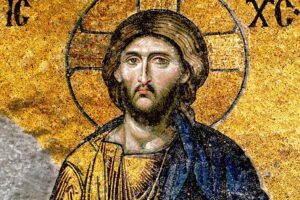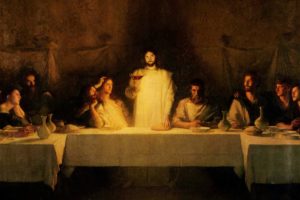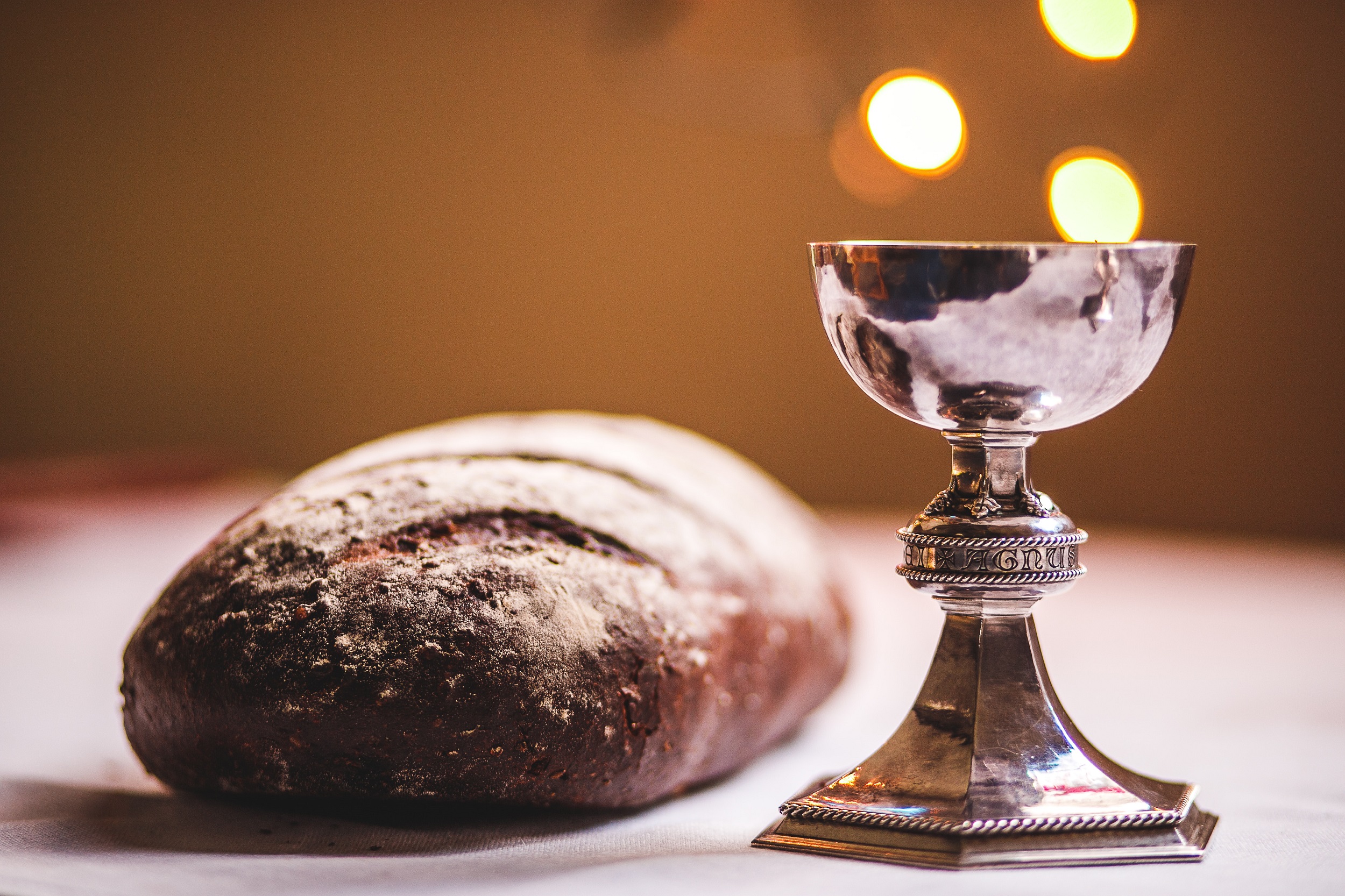Last edited on 6/Apr/2021
The Bible’s Answer
Introduction
Holy Communion—also known as the Lord’s Supper or the Eucharist—is a sacrament in Christianity, meaning that it is a visible and tangible means of God’s grace that has been instituted by Jesus Christ. Unlike the gospel or the Word of God (the Bible) which offers and provides God’s grace invisibly, Holy Communion offers and provides God’s grace visibly and physically.
What Holy Communion Looks Like
Holy Communion is usually done within church buildings. All baptised Christians in the congregation will usually walk up to the front altar in groups to receive bread or a white wafer and wine from a chalice that the pastor(s) and elder(s) will give them. When pastors and elders give Christians the bread, they will usually say something along the lines of “Take and eat, this is the body of our Lord, given for you,” and with the wine they will usually say “Take and drink, this is the blood of Christ, shed for you for the forgiveness of sins.”
Christians may receive Holy Communion kneeling down or standing. Once they have consumed the bread and wine, they will then return to their seats. How often this happens depends on the denomination; it can be done every week, fortnight, or month. However, all churches should distribute Holy Communion every week because of how important it is. So, why do Christians do this and what happens when we do it?
Jesus’ Institution of Communion
The Bible tells us that Jesus instituted Holy Communion on the night when he was betrayed, using bread and wine, and that we are to partake in this holy meal to freely receive the forgiveness of sins:
Now as they were eating, Jesus took bread, and after blessing it broke it and gave it to the disciples, and said, “Take, eat; this is my body.” 27 And he took a cup, and when he had given thanks he gave it to them, saying, “Drink of it, all of you, 28 for this is my blood of the covenant, which is poured out for many for the forgiveness of sins. (Matthew 26:26–28)
We receive the forgiveness of sins when we partake in Holy Communion because Jesus promised we will, and because he is truly present somehow within the bread and wine; it is his true body and blood freely given to us, just as he said. It should be noted that the natural elements of bread and wine still remain as bread and wine in Holy Communion; but Jesus’ body and blood are somehow joined and united with them in such a way that the bread and wine is his body and blood, making it a holy meal. Therefore, it is a means of grace. The Bible does not explain how exactly this happens—it is a mystery that we simply have to accept by faith.
Paul’s Teachings on Communion
Paul builds on Jesus’ teaching, affirming that the bread and wine in Holy Communion is indeed the true body and blood of Christ freely given to us, and tells us that it is a meal of union, whereby all Christians are united as the one church:
The cup of blessing that we bless, is it not a participation in the blood of Christ? The bread that we break, is it not a participation in the body of Christ? 17 Because there is one bread, we who are many are one body, for we all partake of the one bread. (1 Corinthians 10:16–17)
Paul also teaches that Holy Communion is a memorial meal. By partaking in this meal we are proclaiming the Lord’s death until he comes again in glory to judge the living and the dead, and remembering his great sacrifice for our salvation. He also warns us that because we are partaking in the true body and blood of Christ, we should examine ourselves before we do so, because if we partake in it in an unworthy manner we will be guilty of sinning against Jesus himself and eating and drinking judgement upon ourselves:
For I received from the Lord what I also delivered to you, that the Lord Jesus on the night when he was betrayed took bread, 24 and when he had given thanks, he broke it, and said, “This is my body which is for you. Do this in remembrance of me.” 25 In the same way also he took the cup, after supper, saying, “This cup is the new covenant in my blood. Do this, as often as you drink it, in remembrance of me.” 26 For as often as you eat this bread and drink the cup, you proclaim the Lord’s death until he comes. 27 Whoever, therefore, eats the bread or drinks the cup of the Lord in an unworthy manner will be guilty concerning the body and blood of the Lord. 28 Let a person examine himself, then, and so eat of the bread and drink of the cup. 29 For anyone who eats and drinks without discerning the body eats and drinks judgement on himself. 30 That is why many of you are weak and ill, and some have died. 31 But if we judged ourselves truly, we would not be judged. 32 But when we are judged by the Lord, we are disciplined so that we may not be condemned along with the world. (1 Corinthians 11:23–32)
How to Receive Communion in a Worthy Manner
A way that we can properly approach the altar to receive Communion would be to not treat it as an ordinary meal, but rather to believe that we are receiving the true body and blood of Christ, and that by partaking in this we are receiving the forgiveness of all our sins. To receive Communion in a worthy manner we should also remember and honour Jesus’ loving sacrifice upon the cross for our salvation while we do so. We should also treat it as a holy meal where Jesus is present with us in a special way, and approach the altar with a humble and meek heart, knowing that although we don’t deserve God’s grace because of our sins, he is so loving that he forgives us and saves us anyway.
Eternal Life in Christ’s Body and Blood
Jesus also tells us that when we receive his flesh and blood in Holy Communion we receive eternal life, and that we abide in him, and he abides in us:
So Jesus said to them, “Truly, truly, I say to you, unless you eat the flesh of the Son of Man and drink his blood, you have no life in you. 54 Whoever feeds on my flesh and drinks my blood has eternal life, and I will raise him up on the last day. 55 For my flesh is true food, and my blood is true drink. 56 Whoever feeds on my flesh and drinks my blood abides in me, and I in him. 57 As the living Father sent me, and I live because of the Father, so whoever feeds on me, he also will live because of me. 58 This is the bread that came down from heaven, not like the bread the fathers ate and died. Whoever feeds on this bread will live for ever.” (John 6:53–58)
Holy Communion Is Not Just Symbolic
To sum up, we have seen that in Communion: 1. The bread and wine is the true body and blood of Christ. 2. Jesus is truly present with to give us the forgiveness of sins. 3. Jesus abides in us, and us in him. 4. We are united as the body of Christ. 5. We should remember Christ’s great sacrifice for humanity. 6. We should examine ourselves lest we dishonour Christ directly by wrongly partaking in this meal. Because of these reasons, Holy Communion is much more than just a symbol. It is actually a work of God, a means of his grace in which he creates and nurtures faith in our hearts, since faith is that which receives God’s grace and the forgiveness of all our sins. Just like baptism, in Holy Communion we are also passive recipients of God’s grace.
Does this contradict salvation by grace alone through faith alone in Jesus Christ alone? Absolutely not. God is not limited in how he delivers us his grace. According to the Bible, he has chosen three primary ways to deliver us Christ’s merits and redemptive blood shed on the cross: the gospel (or the Word of God), baptism, and Holy Communion (the Sacraments). In each of these means of grace, we simply receive Christ’s benefits won on the cross through faith alone in the promises attached to them. In the same way that the water alone in baptism accomplishes nothing except when the Word of God is attached to it, the bread and wine in Holy Communion is simply bread and wine until the Word of God is combined with it.
Conclusion
Therefore, each time we partake in Holy Communion, the Lord Jesus himself comes down to us to personally grant us forgiveness of sins and eternal life, to strengthen our faith, and to remind us of his loving kindness in his death on our behalf on the cross. It is a way by which God has graciously decided to give us the benefits of the gospel in a way that we can visibly and physically comprehend, and it is continually given to baptised Christians throughout their lives whenever they are gathered together at their local church to worship. It is a free gift of God.
Scripture quotations are from the ESV® Bible (The Holy Bible, English Standard Version®), copyright © 2001 by Crossway, a publishing ministry of Good News Publishers. Used by permission. All rights reserved.







